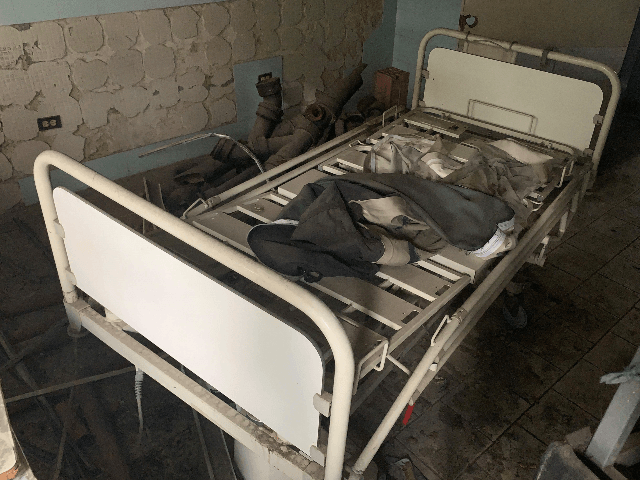A member of a colectivo, the violent socialist gangs the dictatorship uses to stay in power, appeared on Venezuelan television Thursday condemning Nicolás Maduro for failing to repair the only hospital in the nation with a toxicology specialization.
Maduro, the man said, had come to the deteriorating hospital and promised to make it look like “a little cup of silver,” a Spanish language idiom for something being perfect, shiny, and new. Instead, Caracas’ Coche Peripheral Hospital is in ruins, with no usable equipment or medicine and a frustrated staff of doctors and nurses.
Dictator Hugo Chávez stole (“nationalized”) the hospital in 2013 to begin what then-Vice President Nicolás Maduro called a “profound restructuring process.”
Speaking to Venezuela’s NTN24, José Rafael Torres, a member of the colectivo assigned to keep the hospital under Maduro’s power, said that his group felt “betrayed” by Maduro.
“Yes, we feel betrayed … because he [Maduro] came here once and said he was going to turn this hospital into a little silver cup … I’m not seeing any little cup … I feel defrauded,” Torres said. Torres said he had spent ten years “protecting” the hospital as a colectivo member and said he needed the hospital as a patient, as well.
Maduro typically uses colectivos – armed street gangs that operate at the margins of the law – to terrorize people believed to oppose the socialist regime. Colectivos beat, shoot, and kill dissident protesters, attack churches (the Catholic Church opposes Maduro), and hoards food from the population to distribute only to other socialists.
Maduro attempted to export the colectivos by stationing one, comprised of white American members of the radical leftist group Code Pink, at the Venezuelan embassy in Washington before police removed them at the behest of outraged Venezuelans.
The hospital, NTN24 explains, was the last remaining toxicology center in the country and has not been receiving patients for months because it has no medicine or functional equipment. In the NTN24 report, a hospital employee identified as Beatríz Sánchez calls the hospital’s current existence “work death.”
“They gave the soldiers 50 million euros [$57 million] for uniforms and 10,000 bolivars [$1.59] for health worker uniforms,” Sánchez protested. “That’s not equality, that’s not socialism, this is work death, this is a mourning that we are enduring.”
Sánchez said she did not believe the hospital would ever open again.
“We have made a punctual visit to the traumatology unit, listened to part of the community, doctors … we have decided to intervene the Coche hospital to enter a profound restructuring process,” Maduro said in 2013. “We have an army of missionaries from Cuba ready in the public health system.”
Cuba uses doctors as slaves to export communist ideology and generate revenue for the regime. The doctors are not allowed to visit family and do not keep the vast majority of their wages. Venezuela is one of Cuba’s biggest clients.
The Coche hospital shut down in November after months of struggling to treat patients without medicine or equipment.
In February, employees of the hospital protested, demanding that Maduro send humanitarian aid.
“There has been an administrative silence on the part of the ministry [of health],” Zuleika Pérez, a doctor, told the Venezuelan newspaper El Nacional. “The community, the workers, the patients demand that they tell us if they hospital is going to remain like this or if it is going to open. Us doctors want to treat our patients.”
The silence around Venezuela’s medical crisis has lasted years. As early as 2017, pharmaceutical organizations were warning that the country had run out of the basic medicines necessary for a functional health care system. By that time, Venezuela’s largest pharmaceutical organization was estimating that the country was experiencing shortages of about 95 percent of the drugs needed to run its medical system.
The Maduro regime has consistently refused to acknowledge the humanitarian crisis. In 2016, when Venezuelans began crossing into Colombia by the tens of thousands in search of food, senior chavista officials claimed they had done so “for fun.” Last year, rather than acknowledge the demands of protesting medical professionals, the regime conducted mass arrests against them.
Venezuela has repeatedly rejected aid from free nations, including the United States. Maduro set up a roadblock on the Colombian border last year to prevent food and medicine from entering the country because it came from America; one of his top officials went on television and claimed that American food was “carcinogenic” and used as a “biological weapon” to kill Venezuelans. Instead, he accepted medical supplies from China, a country enduring a growing medical crisis due to companies manufacturing vaccines not following industry standards. Maduro also recently accepted food aid from Russia, which his regime has full control of distributing only to allies. Venezuelans have accused the regime of keeping the aid for its supporters or selling it at a profit to impoverished civilians.

COMMENTS
Please let us know if you're having issues with commenting.